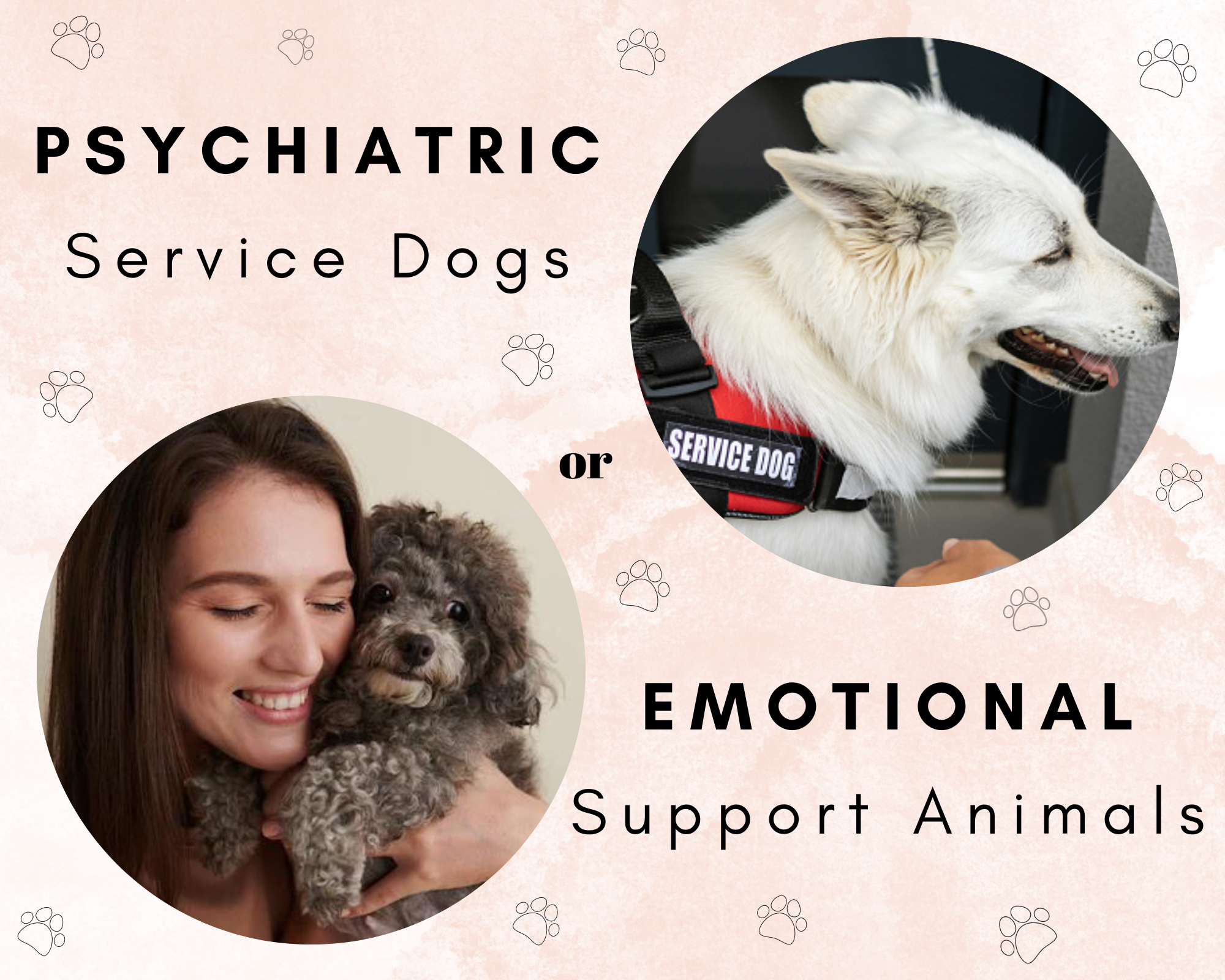- Emotional Support Animals- Definition
- Are Emotional Support Animals Service Animals?
- Do You Have to Certify Your ESA?
- Emotional Support Animals- Access Rights
- Emotional Support Animals- Flying in the Passenger Cabin
- Can Emotional Support Animals Provide Comfort to Many People?
- Psychiatric Service Dog- Definition
- PSDs & ESAs- Difference
- How Can You Make Your Dog a Psychiatric Service Dog?
- Psychiatric Service Dogs- Access Rights
- Psychiatric Service Dogs- Flying in the Passenger Cabin
- Let’s Summarize

Dogs, cats, rabbits, birds...regardless of the specie, our pets make us feel loved and we genuinely enjoy their companionship. In some cases the comfort our beloved pets give us can go outside the traditional owner-pet relationship. People experiencing emotional distress and/or suffering from a mental disability like depression, anxiety, PTSD, bipolar disorder...etc., consider more often turning their pets into Emotional Support Animals (ESA) or Psychiatric Service Dogs (PSD).
Although these terms sound similar, as both types of animals provide emotional/mental comfort, there are some essential differences between them. We will explain the nature of the ESA and PSD, which will help you understand the difference between them and thus decide easier which type would be more suitable for you.
Emotional Support Animals- Definition
Emotional Support Animals (ESA) are animals that provide comfort and companionship to a person with a mental disability. These animals can be all domesticated species, including dogs, cats, guinea pigs, rabbits...etc. The presence of the animal alleviates the symptoms of the disability or at least one aspect of it.

Are Emotional Support Animals Service Animals?
No. ESAs are not considered service animals, as they do not perform specific tasks, directly related to the person’s disability. They provide comfort and companionship only.
How Can You Make Your Pet an ESA?
In order to make your pet an ESA, you need to consult a mental health professional. You should be able to provide a letter issued by a licensed mental health professional that verifies your need of an ESA as part of your treatment. Usually, these letters are valid for one year after the date of issue. Renewal is required so that it can be confirmed that your diagnosis has not changed and an ESA is still prescribed as a part of the treatment. Your pet (usually a dog) should be well-behaved. Although he/she should know basic obedience, advanced training is not required.
Do You Have to Certify Your ESA?
No, Emotional Support Animals are not required to be certified, and neither is their official ESA registry.
Emotional Support Animals- Access Rights
Since ESAs are not considered service animals, their access rights are limited. ESAs in the United States are not protected under the Americans with Disabilities Act (ADA) and may be denied access to public places. Business owners/employees are not required to allow ESAs on their premises. However, according to some state/local governments, ESAs may be able to visit public places. In this case the handler should check the laws with the relevant state or local agencies. If the law does not specifically require the premises to allow ESAs, the pet policy of the premises apply.
Although ESAs do not have protection under the ADA, the Fair Housing Act guarantees their accommodation rights before landlords:
“There have been numerous complaints, administrative hearings, and court cases regarding the obligation of covered entities under FHA to allow individuals with disabilities to live with their assistance animals. There seems to be no dispute that whatever the animal is “called”—e.g., emotional support animal, or service animal—all must be considered as a reasonable accommodation to the rules or policies of a housing provider.” You can read the full text here.
Emotional Support Animals- Flying in the Passenger Cabin
At the end of 2020, the Air Carrier Access Act regulation in regard to transportation of service animals has been revised by the U.S. Department of Transportation (DOT). According to the new rules, ESAs are no longer considered service animals and are not allowed to travel in the passenger cabin free of charge. They will be considered pets and pet fees will apply to them.

Can Emotional Support Animals Provide Comfort to Many People?
An ESA is supposed to provide comfort and companionship to one person only. Animals, that support many people, help them undergo treatment easier, and that accelerates the process of healing/learning/participating in daily activities, are known as Therapy Animals.
Psychiatric Service Dog- Definition
A Psychiatric Service Dog (PSD) is a type of service animal, that performs specific tasks, for the benefit of a person with a mental disability. These tasks must be directly related to this disability.
PSDs & ESAs- Difference
The ADA postulates the differences between PSDs and ESAs by stating:
“If the dog has been trained to sense that an anxiety attack is about to happen and take a specific action to help avoid the attack or lessen its impact, that would qualify as a service animal. However, if the dog's mere presence provides comfort, that would not be considered a service animal under the ADA”.
You can read more about the service dog regulations in the United States here.
Another important difference between both types of animals is that PSDs can be only dogs (some US states also recognize miniature horses as service animals), while ESAs can be all types of domesticated species.
How Can You Make Your Dog a Psychiatric Service Dog?
In order to make your dog a PSD, you need to:
1. Be eligible for a service dog;
2. Go through relevant service dog training.
As we explained, only people with a disability are eligible for service animals. Let’s clarify the term “disability”:
A person with a disability is defined as a person “who has a physical or mental impairment that substantially limits one or more major life activity. This includes people who have a record of such an impairment, even if they do not currently have a disability. It also includes individuals who do not have a disability but are regarded as having a disability. The ADA also makes it unlawful to discriminate against a person based on that person’s association with a person with a disability”.
Also, there is a minimum age at that a person can become a service dog handler. In most cases it is at least 12 or 14 years. However, regulations in regard to the age are also not unified and you should check the local laws.
When it comes to service dog training, handlers in the US and the UK are allowed to train their own service dogs and Psychiatric Service Dogs in particular. This means that they are not required by law to hire a professional trainer or contact a training organization. Having a service dog through a non-profit organization is also a good option, however, if you decide to go that way, you should be patient, as there are usually long waiting lists. One more option for service dog training is enrolling in an online training program, where you will have the opportunity to train your own dog while being guided by a tutor.
Service dog owners in the US are not required by law to have a letter issued by a medical professional in order to verify their need of a service dog. However, since service dog laws vary on a local level, we would recommend that you check the regulations in your country/state/province, in case you may be asked for such a letter. For example, in Ontario, Canada, you may be required to show the following documentation:
-documentation from a regulated health professional;
-an identification card from the Ontario Ministry of the Attorney General (valid for people who are blind and use a guide dog).

Do You Have to Certify Your PSD?
Handlers in the US and the UK are not required to certify their service dogs/assistance dogs and Psychiatric Service Dogs in particular. These dogs may be individually trained by their owner to perform tasks that suit their needs. However, many service dog owners decide to certify their service dogs for several reasons:
1. Verify that the dog has gone through a service dog training program;
2. Verify that the dog is well-behaved and will not behave disruptively;
3. Notify the general public that their dog is a working dog and not a pet.
Just like Emotional Support Animals, registering your service animal, does not automatically provide any access rights. Service dogs in the UK, known as “Assistance Dogs”, are also not required to be certified or registered.
According to Assistance Dogs UK: “There is no register or certification process for assistance dogs in the UK. Whilst all assistance dogs trained by members of ADUK are issued an ADUK Identification Booklet, not all assistance dog owners have papers or ID, nor do they require ID by law.”
Similarly to the letter issued by a health professional, a certificate issued by a school/training organization specialized in service dog training may be required based on your location. Also, you may need to go through public safety/access test to verify that your service dog has been well-trained. For example, if you are based in British Columbia, Canada, you have two options to get a service dog:
1. To receive a trained dog from an accredited school;
2. To pass a public safety test with a dog you have trained yourself or with the help of a private trainer.
Psychiatric Service Dogs- Access Rights
Since PSDs are a type of service animal, hence they are considered medical equipment, and they must be granted public access rights. The ADA states:
“The ADA requires State and local government agencies, businesses, and non-profit organizations (covered entities) that provide goods or services to the public to make "reasonable modifications" in their policies, practices, or procedures when necessary to accommodate people with disabilities. The service animal rules fall under this general principle. Accordingly, entities that have a "no pets" policy generally must modify the policy to allow service animals into their facilities.”
According to the service dog regulations in the US, there are a few exceptions to this rule, and service dogs may be excluded in certain cases:
1. If they behave disruptively/cause damage and are not under their handler’s control;
2. If covered entities will need to fundamentally alter the nature of the offered products, services, programs, or activities, to accommodate the service animal.
3. If public health rules apply (the ADA can not override these), i.e. dogs are prohibited in swimming pools
4. Religious institutions are excluded from the ADA rules and service animals may be prohibited;
You should always check the
local laws to make sure that you and your service dog meet the
acceptance requirements. For example, some countries/states/provinces
may require a certificate issued by a professional
trainer/organization to recognize your PSD and provide him/her with
public access rights.
Psychiatric Service Dogs- Flying in the Passenger Cabin
Unlike Emotional Support Animals, Psychiatric Service Dogs are allowed to travel in the passenger cabin free of charge. However, we need to note, that you should always double-check the service dog policy of the airline you will be traveling with.
If you have trained the dog yourself and the airline you will be traveling with, does not accept owner/self-trained service dogs, your paw friend will be denied access. US-based airlines accept owner/self-trained service animals (at the time of writing), so you should not have problems flying with your trained service animal.
Most European airlines accept owner/self-trained service animals for direct flights from/to the US. Some accept owner/self-trained dogs for flights in Europe as well, while others require certificates issued by ADI/IGDF members, or by organizations that offer in-person training.
Let’s Summarize
Emotional Support Animals provide comfort and companionship only, while Psychiatric Service Dogs do specific work/perform specific tasks to mitigate the symptoms of a mental disability. Their nature and their access rights are different.
Which one would be a better option for you depends on your needs, what type of assistance providing the animal you are eligible for, and your local regulations.











